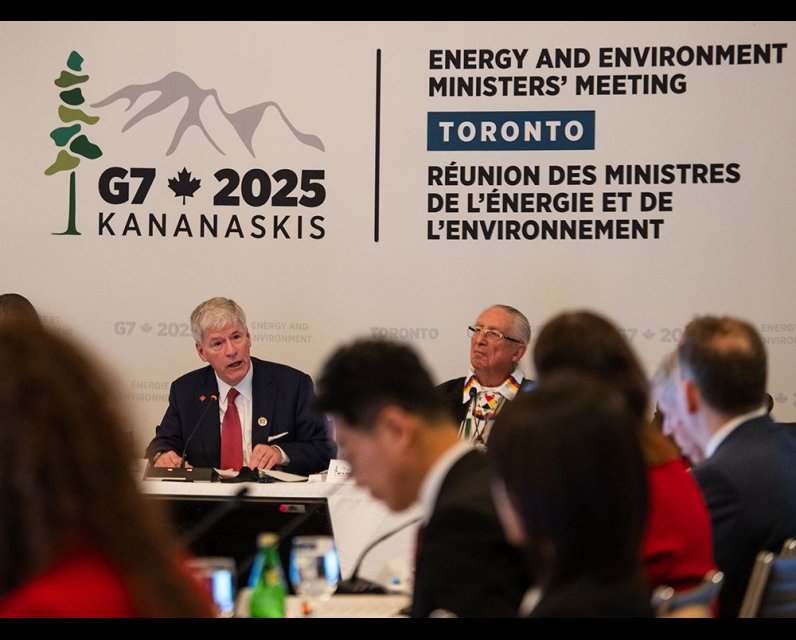G7 ministers looking to Canada for critical minerals despite China deal

TORONTO – The American and Chinese presidents may have struck an agreement to ease China’s sharp curbs on exporting critical minerals, but G7 politicians meeting in Toronto said Thursday they’re still pushing ahead with plans to find alternative supplies of the crucial resource.
Canada strives to mine and refine more of the substances — needed in everything from electric cars to fighter jets — and figures large in those plans, at least one of the G7 representatives indicated.
“The agenda (to broaden critical mineral supply) hasn’t changed,” Katherina Reiche, Germany’s minister for economic affairs and energy, told reporters a day after the Beijing-Washington accord. “It will be a hot topic.”
“Canada is one of our most interesting and important partners when it comes to critical materials. We will look into certain projects and discuss this with our Canadian friends over the next two days, which projects we can invest in … We need cooperation, we need diversification.”
An industry spokesman welcomed the statements, but said both government and industry in Canada need to be “bold” after decades of inaction on the critical-minerals front.
Chinese President Xi Jinping agreed in a high-stakes meeting with U.S. President Donald Trump Wednesday to pause for a year the tight controls it slapped on the export of rare-earth elements two weeks ago. Trump agreed in return to reduce tariffs imposed on China related to its role in the fentanyl crisis.
Rare earths are a basket of 17 substances required to manufacture magnets and other parts of widely used modern technology. China has a stranglehold on the supply of the materials, dominating 69 per cent of rare-earth mining, 92 per cent of refining and 98 per cent of magnet manufacturing, Goldman Sachs investment bank has estimated.
The accord struck by Xi and Trump puts on hold China’s latest restrictions on exports of the minerals, imposed in a dramatic escalation of its trade war with America. But it’s unclear if the deal affects the first round of limits Beijing imposed in April. Those curbs threw a wrench in global supply chains, causing some automakers to pause production at certain plants.
China also controls much of the market for other minerals critical to today’s technologies.
The G7 energy and environment ministers meeting in Toronto Thursday and Friday were expected to ink a more-detailed version of the “critical-minerals production alliance” that the countries’ leaders agreed on at the group’s June summit in Alberta.
Canada has indicated a desire to be at the centre of that program, with Prime Minister Mark Carney touting critical-mineral development as one of the “nation-building” projects he wants to encourage.
“These minerals .. underpin our industrial strength and our strategic security,” Canadian Energy Minister Tim Hodgson told his G7 colleagues Thursday. “There is little doubt our seven nations stand strong together. Canada, like all of you, believes that the whole is stronger than any one part. So let us leave this meeting not with promises, but with real concrete progress.”
Canada could, in fact, play a major role in weaning the West off its dependence on Chinese critical materials, said Ian London, executive director of the Canadian Critical Minerals and Materials Alliance.
It has vast resources of rare earths and other critical materials, as well as the expertise needed to exploit those natural assets, he said in an interview. But Canada must act now and quickly, with industry being more “bold” and government playing a lead role – perhaps by actually investing in companies, said London.
The country should also make sure it does more than just export raw material and mirror China’s role in value-added refining and processing of the materials.
“Currently when you look at the prime minister, you look at the minister of energy, they’re proactive and I like what I hear,” he said. “But it’s not what I hear (that’s important), It’s what they’ve actually accomplished.”
“We have a number of projects progressing, but slowly. We’ve also had this for the last 20 years. This is not a new story. Our challenge is getting on with it.”
But how exactly did the West land in the predicament of having to rely on a major strategic rival for what Hodgson calls “the indispensable building blocks” of defence and other modern technology?
London says the answer is simple. Western countries and industry are fixated on quarterly results and other short-term goals. They were happy to take advantage of a China that provided critical materials at a cheap price, while bearing the environmental costs of extracting and processing them, he said.
As Canada and others dithered, Asian nations like China and Korea thought long-term and began developing critical materials in the late-1980s, said London.
Our website is the place for the latest breaking news, exclusive scoops, longreads and provocative commentary. Please bookmark nationalpost.com and sign up for our newsletters here.




Comments
Be the first to comment